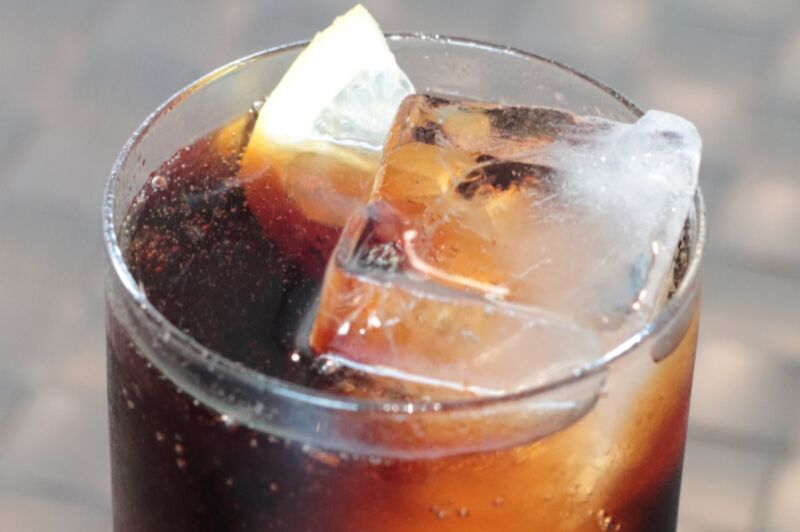There's always a marked increase in ER visits during the holiday season involving people getting bites of partially chewed turkey or similar foodstuffs stuck in their throat. Googling home remedies might encourage you to just sip on some cola instead, letting the carbonation help dislodge the food and sparing you an emergency endoscopy. Sure, cola is cheap and widely available, with few (if any) side effects. But you might want to think twice about skipping the ER, according to a new study published in the British Medical Journal that concluded this popular folk remedy probably doesn't help clear a blocked esophagus.
"Emergency physician Elise Tiebie, the driving force behind this project, saw online that this was really a rumor, from tip websites to Wikipedia as well as an anecdote in a British newspaper about paramedics saving a life by using cola. I've even heard doctors recommending it,” said co-author Arjan Bredenoord, a gastroenterologist at Amsterdam University Medical Centers. Getting food stuck in one's esophagus "can be really dangerous, so it's important that people get the correct treatment," he added. "That's why we wanted to check if this works."
The technical term is "esophageal food bolus obstruction," more commonly known as "steakhouse syndrome" or "backyard barbecue syndrome." It's usually pieces of poorly masticated meat (steak, poultry, pork) that get stuck, and when that happens, the unfortunate soul will have trouble swallowing to the point of drooling (since they can't even swallow their saliva). They may also have chest or neck pain, and there's always the chance that the esophagus will be perforated, leading to aspiration into the lungs. Hence, a trip to the ER is necessary.
Occasionally, the obstruction will dislodge spontaneously, but more often than not, an endoscopy is needed. In fact, it's recommended for diagnostic purposes even when the problem resolves on its own. Such blockages are usually due to potentially serious medical conditions: mucus rings forming in the lower esophagus, inflamed esophageal mucosa, fistula, "nutcracker esophagus," and esophageal cancer, to name a few. There was a time when ER physicians would sometimes administer glucagon to dislodge the obstruction, but the science has not borne this out as an effective treatment. And there is only limited evidence that medications like hyoscine butyl bromide, benzodiazepines, and opioids are effective. The use of meat tenderizer is now discouraged since it increases the risk of esophageal perforation.
The use of carbonated drinks like cola to relieve food obstructions has been around for at least 20 years, and probably longer, since cola was mentioned as an effective remedy in a 1993 paper (albeit a small study involving just eight patients). Among the more recent studies is a 2018 retrospective case series involving chart reviews of 19 patients who wound up in the ER with esophageal obstructions and drank cola as an intervention. This worked in more than half (59 percent) of those patients. However, the authors acknowledged that the retrospective nature of their study resulted in several limitations and the risk of interpretation bias.
It's also unclear precisely how cola works to dislodge food stuck in the throat. The prevailing hypothesis is that the carbonation helps disintegrate the stuck food, but this was not supported by a 2004 study in which cola failed to dislodge pieces of cooked chicken tightly squeezed inside graduated syringes. Alternatively, cola may help relax the esophagus to help dislodge the stuck food, although the evidence for this is not yet conclusive.
Bredenoord et al. conducted a randomized controlled trial of 51 patients admitted to the ERs of five Dutch hospitals between December 2019 and June 2022. Of those, 28 were administered cola at regular intervals, while the remaining 23 waited for the obstruction to clear on its own. Endoscopies were performed if the obstruction didn't clear on its own in both groups within the prescribed amount of time.
The results: the obstructions cleared spontaneously in 61 percent of the subjects, regardless of which group they were in, so the administration of cola didn't result in a higher rate of improvement. That said, it's still a relatively small study. There were no adverse effects, so further studies administrating cola before performing endoscopies could be useful, per the authors. Follow-up endoscopies are still a good idea since, in 78 percent of those cases, there were underlying pathologies contributing to the obstruction.
British Medical Journal, 2023. DOI: 10.1136/bmj-2023-077294 (About DOIs).



3175x175(CURRENT).thumb.jpg.b05acc060982b36f5891ba728e6d953c.jpg)
Recommended Comments
There are no comments to display.
Join the conversation
You can post now and register later. If you have an account, sign in now to post with your account.
Note: Your post will require moderator approval before it will be visible.